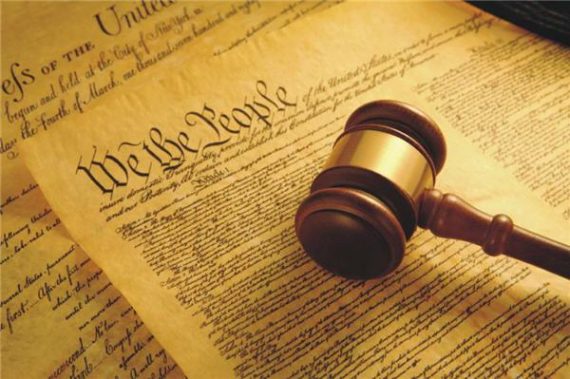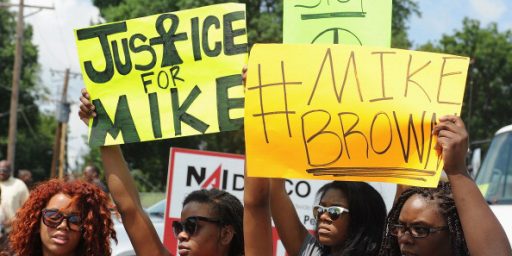North Carolina Man Charged With Violating Law Already Held To Be Unconstitutional
Watch your language in Wilson County, North Carolina.
A man in North Carolina has been charged with violating a 100 year old law law dealing with the use of profanity that has already been held to be unconstitutional:
Police have charged a Wilson man with violating a 100-year-old profanity law that a North Carolina judge has found unconstitutional.
Prosecutors and police commanders said Friday they would examine the arrest of 37-year-old Joey Ricky Carson on a charge of using profane language on a public road or highway. Carson was arrested Dec. 21 and has a court appearance scheduled in February.
“If a court with jurisdiction has made a ruling on the statute that is applicable and that ruling deems it unconstitutional, then one possible remedy would be a voluntary dismissal,” Assistant District Attorney Charles Thomas said.
Thomas was unfamiliar with Carson’s case and said prosecutors would research the matter before deciding how to proceed. A judge could rule on the merits of the case in a hearing or choose to toss out the charge if prosecutors decline to dismiss it.
Here are the facts of the case:
Wilson police officers approached Carson at 7:39 p.m. Dec. 21 when they found him sitting in a car with its headlights out on the 1200 block of Adams Street, police spokesman Sgt. Steve Stroud said.
“While the officers were approaching Carson, he opened his car door and the officers inquired about his presence in the area,” Stroud said in a Friday statement summarizing the arrest. “Carson began using profanity at the officers even after being warned (that) doing so would subject him to arrest. Carson continued using profanity during the encounter and was arrested for using profanity on a street or highway.”
Stroud didn’t describe the profanity Carson is accused of using. A warrant for his arrest lists only text from the state statute and does not record Carson’s words.
Carson was brought before a Wilson County magistrate and received a $500 secured bond. His court appearance on the charge is scheduled for Feb. 11.
N.C. General Statute 14-197 states that if a person “shall, on any public road or highway and in the hearing of two or more persons, in a loud and boisterous manner, use indecent or profane language, he shall be guilty of a Class 3 misdemeanor.”
The statute dates back to 1913, well before the Supreme Court started dealing in earnest with First Amendment cases, however as noted above it was declared unconstitutional as recently as two years ago by a North Carolina trial court Judge:
Nearly two years ago, an Orange County judge ruled that the law could not be enforced because it violates residents’ First Amendment right to free speech.
Superior Court Judge Allen Baddour granted a motion to dismiss a profanity charge filed against Samantha Elabanjo, who was accused of telling Chapel Hill police officers to clean their “damn dirty car” and calling the officers a vulgar name.
Baddour found the law to be vague and overbroad, writing in a Jan. 5, 2011 order that it “prohibits and criminalizes constitutionally protected speech.”
The 1913 statute “defines neither ‘indecent’ nor ‘profane,’ and thus leaves to the imagination, or to an officer’s discretion, what those terms mean and which words used in what context would be prohibited,” Baddour wrote.
“There is no longer any consensus, if there ever was, on what words in the modern American lexicon are ‘indecent’ or ‘profane,'” the judge concluded. “A reasonable person cannot be certain before she acts that her language is not violative of this law, and it is therefore unconstitutionally vague.”
Thomas, who is the lead prosecutor for Wilson County under District Attorney Robert Evans, said his office would examine the facts of Carson’s case. He said the Orange County ruling would be taken into consideration.
Baddour’s analysis of the law is “applicable but not binding” on Wilson County, he said
You can read Judge Baddour’s 2011 opinion here, and while it is not as detailed as what you’d see from a Federal Judge or an Appeals Court Judge, it does set forth a fairly strong argument for why the law is unconstitutional. The most important point that Judge Baddour strikes on in his opinion is that the law is vague in what constitutes indecent or profane. As the U.S. Supreme Court cases that Baddour cites state, a law that is to vague that someone cannot reasonably be said to be aware of when they’re violating it then it is per se unconstitutional. In this case, as he notes, by not defining what constitutes “indecent” or “profane” the statute makes it impossible for anyone to know what violates the law, and gives far too much discretion to law enforcement to charge people with violating the law. Indeed, it’s worth noting that the both this new case and the one from 2011 involve situations where someone who had been stopped for whatever reason by the police used certain language in response to being stopped, language which likely occurs on a nearly daily basis in police-citizen encounters. Although this part of statute is not dealt with in Judge Baddour’s opinion, it’s worth asking whether the statute was intended to apply to police-citizen encounters. One can make an argument that there’s a difference between someone who stands in the middle of a public venue and starts cursing out random members of the public, including children, and one where someone uses a couple of the “seven dirty words” after being pulled over by the police. Of course, given Judge Baddour’s opinion, which while not binding in a different county certainly ought to be considered persuasive authority, that issue didn’t need to be reached at all.
As a final note, it’s worth noting that laws against using profanity in public aren’t necessarily unconstitutional in all cases. The Supreme Court has ruled that using profanity is protected speech in some cases, such as in California v. Cohen, where it found that an anti-Vietnam war message that used profanity was protected political speech. It has also ruled in other cases that, depending on both the circumstances and the language of the statute, someone could be charged with violating the law for using profanity if it fell into the category of fighting words. See e.g., Chaplinsky v. New Hampshire. In that case, Justice Frank Murphy, writing in the majority opinion, stated the following:
There are certain well-defined and narrowly limited classes of speech, the prevention [315 U.S. 568, 572] and punishment of which has never been thought to raise any Constitutional problem. 3 These include the lewd and obscene, the profane, the libelous, and the insulting or ‘fighting’ words-those which by their very utterance inflict injury or tend to incite an immediate breach of the peace. 4 It has been well observed that such utterances are no essential part of any exposition of ideas, and are of such slight social value as a step to truth that any benefit that may be derived from them is clearly outweighed by the social interest in order and morality. 5 ‘Resort to epithets or personal abuse is not in any proper sense communication of information or opinion safeguarded by the Constitution, and its punishment as a criminal act would raise no question under that instrument.’ Cantwell v. Connecticut,310 U.S. 296, 309 , 310 S., 60 S.Ct. 900, 906, 128 A.L.R. 1352.
Another famous case dealing with the use of profanity, of course, is the one that deal’s with George Carlin’s famous “seven dirty words” routine, Federal Communications Commission v. Pacifica Foundation. In that case, the facts of which are I think popularly known (if not, you can watch the NSFW video of Carlin’s routine here), That case, though, primarily relied upon the fact that they were being broadcast to the general public on the radio, as Justice John Paul Stevens makes clear:
It is appropriate, in conclusion, to emphasize the narrowness of our holding. This case does not involve a two-way radio conversation between a cab driver and a dispatcher, or a telecast of an Elizabethan comedy. We have not decided that an occasional expletive in either setting would justify any sanction or, indeed, that this broadcast would justify a criminal prosecution. The Commission’s decision rested entirely on a nuisance rationale under which context is all-important. The concept requires consideration of a host of variables. The time of day was emphasized by the Commission. The content of the program in which the language is used will also affect the composition of the audience, 29 and differences between radio, television, and perhaps closed-circuit transmissions, may also be relevant. As Mr. Justice Sutherland wrote, a “nuisance may be merely a right thing in the wrong place, – like a pig in the parlor instead of the barnyard.” Euclid v. Ambler Realty Co., 272 U.S. 365, 388 . We simply hold that when the Commission finds that a pig has entered the parlor, the exercise [438 U.S. 726, 751] of its regulatory power does not depend on proof that the pig is obscene.
This quite obviously does not apply in the North Carolina case given that the alleged profanity was directed at two police officers with no members of the general public around to even hear them. At the same time, though, it makes clear that there are certain circumstances where using profanity can lead to legal trouble. The North Carolina statute, though, seems to clearly be both overly broad and constitutionally vague. The prosecutors in Wilson County ought to seriously consider dismissing the charges before they come out of this looking like fools.
H/T: Reason News






The silliest part is that it’s perfectly legal to cuss to your heart’s content in the Counties of Pitt and Swain, just not anywhere else.
So yeah…it’s a bad arrest.
In the meantime this guys life is turned upside down.
And does he have the resources to adequately deal with it?
Or, more likely, is it going to be an albatross for months…or years.
This kinda police overstepping bothers me a lot more than the NSA stuff.
But the Republicans have already informed us that it doesn’t matter if even the Supreme Court says a law is constitutional or not — it’s how they feel about it. Granted, this was in the context of Obamacare and gun regulations, but why shouldn’t cursing come into it, too?
Remember, if you have a question about the constitution, the only two sources you can trust are Ted Cruz and a tea-partier with an elementary school education.
This is a real infringement of freedom of speech, unlike the nonsense with the duck call guy, not that the idiots who were outraged about that will understand the difference.
@mantis: This will in all likely circumstances be dismissed before it winds up in court. Around here, if a person uses bad language or shows any disrespect of police officers, they are going in for sure. After a few hours they will be released with no arrest unless they had other problems. The police usually expect an apology; the sooner the better.
@Tyrell:
That’s a pretty Pollyanna view.
A cop with an attitude problem can make your life hell…if not deadly.
http://en.m.wikipedia.org/wiki/Contempt_of_cop
I’m familiar with this law. At least in the 1990s, it specifically exempted Pitt and Swain counties. A friend of mine from NC told me that once he and a bunch of his friends got in a car, drove to Swain County, and stood on the road cursing for about twenty minutes.
@C. Clavin: May well be, but as a St Louis cop once said to a poor West county white boy with more money then the good common sense to not bother complaining that he knew his rights, “You have the right to do what I tell you…”
That was about one and a half seconds before the billy club crashed into the mouthy little punks knee cap.
(Yeah, I know, just horrible, but those of us with out the money to fight the daily injustices that are inflicted upon us have a right to laugh at a rich boy getting his comeuppance every now and again)
@C. Clavin: That is true as I have been on the wrong side of this deal, but luckily all I got was verbal abuse from a policeman at an arena, who evidently did not want to work that night and took it out on everyone, but when he tried his junk on a Girl Scout den mother, she put him in his place but good. He turned around and walked off.
Our town is ran by the police chief, who is also the mayor, justice of the peace (judge), owns most of the businesses, runs the local elections board, and has a bunch of relatives on the town council. Whatever he says goes. This is “Macon County Line” (Max Baer’ s great movie of the ’60’s).
@Tyrell:
So basically where you live the police are lawless bullying thugs? That’s unfortunate.
Didn’t y’all get the memo that Sherriffs will make the determination what laws are constitutional and what laws are not.
Reminds me of all the law enforcement officials deciding on the legality of State gun laws.
Please tell me that the DA down there isn’t taking this turkey to trial …
Mr Carson is guilty of p!ssing off a cop while black. In 1913 he might have been lynched.
http://www.wilsontimes.com/News/Feature/Story/Man-arrested-under-1913-profanity-law